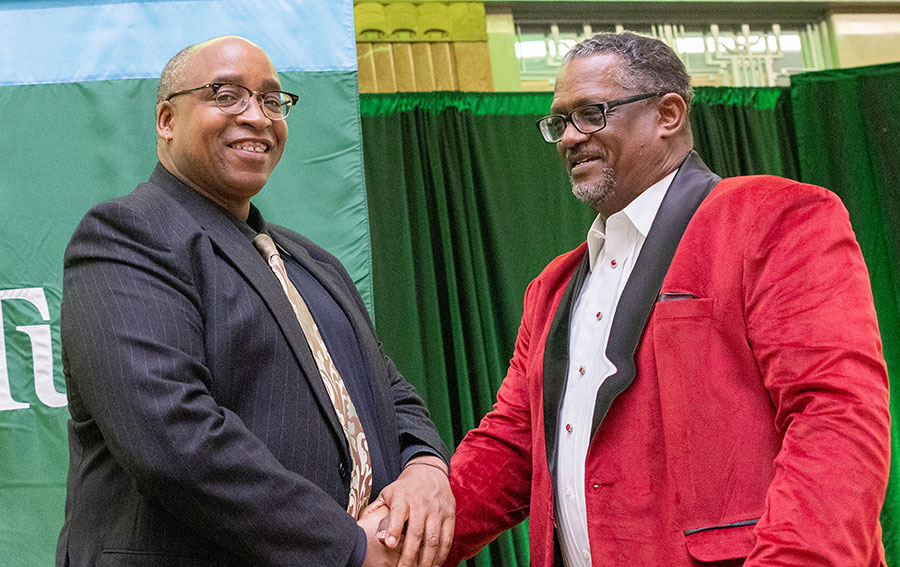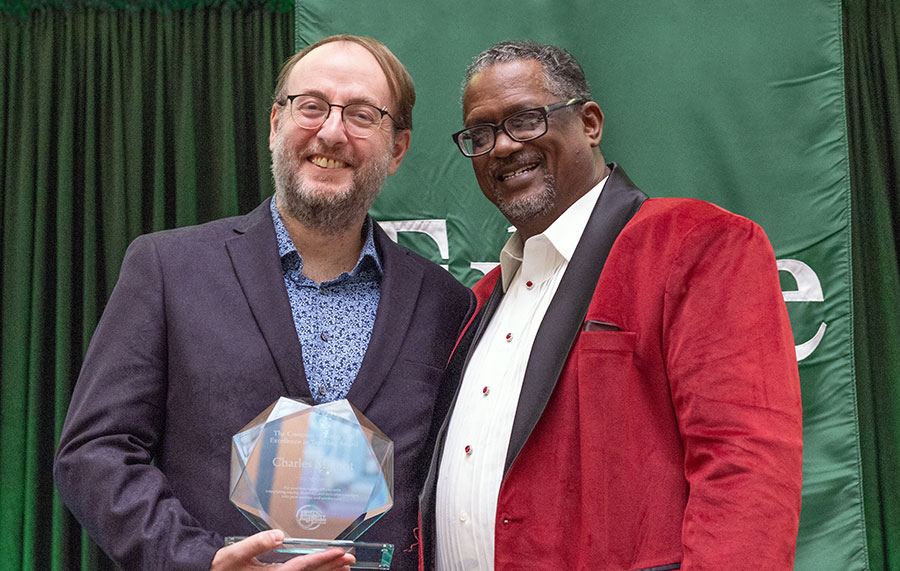The best academic leaders know how to challenge the narrative — especially in fields largely dominated by white voices — in order to work towards a more racially and culturally accurate picture of the humanities.
Tulane’s Equity, Diversity, and Inclusion (EDI) awards were created to recognize such initiative and leadership within the Tulane community. This year, two of those awards went to John “Ray” Proctor and Charles Mignot: School of Liberal Arts faculty members who — from the performing arts to language learning — stand out for the way they create spaces that are inclusive and representative of all students; center minoritized people and highlight their accomplishments; and emphasize overall care and advocacy of students' valuable contributions in academia and beyond.
 John “Ray” Proctor, an Assistant Professor of Theatre, received the North Star Faculty EDI Leadership Award for his commitment to EDI on Tulane’s campus and within the wider New Orleans community. Proctor, who actively participates in events such as Black student graduation ceremonies and orientations for queer and BIPOC students, served as EDI Director for the 2023 inaugural Newcomb Tulane College Summer Research Institute: EDI and Race — a program aimed at expanding student understanding of EDI and the impacts of race on scholarly research. Last spring, he also organized the Rac(e)ing Shakespeare workshop, which invited scholars to explore race within Shakespearean research and performances in the Southern United States.
John “Ray” Proctor, an Assistant Professor of Theatre, received the North Star Faculty EDI Leadership Award for his commitment to EDI on Tulane’s campus and within the wider New Orleans community. Proctor, who actively participates in events such as Black student graduation ceremonies and orientations for queer and BIPOC students, served as EDI Director for the 2023 inaugural Newcomb Tulane College Summer Research Institute: EDI and Race — a program aimed at expanding student understanding of EDI and the impacts of race on scholarly research. Last spring, he also organized the Rac(e)ing Shakespeare workshop, which invited scholars to explore race within Shakespearean research and performances in the Southern United States.
In addition to these events, Proctor also collaborates with the New Orleans Center for the Gulf South (NOCGS) each February as co-organizer of the “African American Women Affecting the Arts” event.
“This gathering reflects his and our interest in centering Black women’s creative expression and experiences and bridging the academic and public,” said NOCGS Clark Executive Director Rebecca Snedeker. “Dr. Proctor is a visionary, kind, dependable, and fun partner, and we deeply appreciate this ongoing collaboration.”
Andrea Boyles, Associate Dean for Diversity, Equity, and Belonging (EDB) for SLA, nominated Proctor for the EDI award. Also mentioning Proctor’s partnership with No Dream Deferred, a local African American theater company, Boyles says that this award honors “the many ways Ray routinely invests labor and time towards equitably advancing the experiences and overall quality of life for minoritized and underserved people across communities.”
In New Orleans — where Francophone heritage includes Creole, Haitian, Acadian, and Caribbean populations, to name a few — an inclusive and diverse study of French culture and language feels all the more crucial.
 Charles Mignot, Senior Professor of Practice in French, Director of Linguistics, and Director of the French Language Program, received the Compass Faculty EDI Excellence in Teaching Award, recognizing his success with incorporating EDI methods into his pedagogy. Juliette Papadopoulos, a Ph.D. candidate in French Studies who nominated Mignot, praised his focus on diversity within his courses, where he regularly challenged colonial and Eurocentric views. In an intermediate French class, for example, Mignot encouraged Papadopoulos to include an intercultural module on the topic of race in France, allowing her to dedicate time to teaching the issue. The topic proved very engaging.
Charles Mignot, Senior Professor of Practice in French, Director of Linguistics, and Director of the French Language Program, received the Compass Faculty EDI Excellence in Teaching Award, recognizing his success with incorporating EDI methods into his pedagogy. Juliette Papadopoulos, a Ph.D. candidate in French Studies who nominated Mignot, praised his focus on diversity within his courses, where he regularly challenged colonial and Eurocentric views. In an intermediate French class, for example, Mignot encouraged Papadopoulos to include an intercultural module on the topic of race in France, allowing her to dedicate time to teaching the issue. The topic proved very engaging.
Promoting regular practices of co-teaching and collaboration, Mignot encourages his graduate students to contribute to the curriculum, fostering an inclusive environment where mentees create their own intercultural lessons for the classroom — such as the one Papadopoulos led on indigenous tourism and reconciliation efforts in Canada. Through Tulane’s Language Learning Center, Mignot also developed Francophones à la Nouvelle-Orléans (previously Français à la Nouvelle-Orléans) for beginner French speakers. Online courses in this Open Education Resource focus on communication skills rather than traditional grammar structures and promote accessible language learning for all. Within this resource and other teaching materials, Papadopoulos commended Mignot for providing students with a “more global and more inclusive vision of the Francophone world, while questioning the historical whiteness and Eurocentric perspectives that have dominated the French curriculum.”
In a city steeped in diverse cultural influences, the recognition of faculty members like Dr. Proctor and Dr. Mignot speaks to SLA’s commitment to fostering an inclusive academic community, celebrating diversity and minority voices, and valuing the labor and leadership it takes to advance such efforts.

